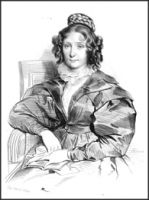Klementyna Hoffmanowa
"All Polish children are my children” (Clementine Hoffman)
Why do I consider this woman as an important person?
She was the first woman in Poland who made a living from creative work and teaching, and was one of the first Polish writers for children. Parts of her work were included in the XIX century and in the period between the wars into children's reading-books and school exercise books. Also thanks to Clementine there was gradual reduction of the French novel readers, in exchange getting them interested in the achievements of Polish novelists. She was interested in the issue of education for women, due to lack of sufficient knowledge and skills they have not able to on gainful employment.
Biography
Clementine Hoffman, maiden name Tańska was born on 23.11.1798 in Warsaw. She was the daughter of Polish writer Ignatius Tański and Maria Czempińska. Her parents were in affinity with many great families, but lived poorly in Wyczułki a village near Warsaw. Soon, her father took a job as secretary of the Prince Czartoryski at Pulawy, where he moved with his wife. Clementine was given for upbringing and education to Danuta Szymanowska in Izdebna. In her home Clementine spent her childhood, with she met her parents only in the summer.
She found it very hard to endure the separation. Teaching in Izdebna was in French and Clementine to the age of sixteen wrote and read only in this language. She had no contact with Polish books.
After her father’s death she moved with her mother to Warsaw. Here she met Bishop John Paul Woronicz and Kazimierz Brodziński (poet and literary critic). Under their influence she began to read and write in her native language, recognizing its importance and beauty. At her mother’s home there gathered a group of enlightened people and scholars, who they saw in Clementine mental acuity and the gift of expressing herself and they encouraged her to „take the pen in hand”.
She obeyed and made the first attempts at writing. Her first work has been accepted for publication in the Memoirs of Warsaw, and the first of its larger work was fictionalized pedagogical tractate „The reminders of the good mother” of 1819. The whole Warsaw was reading this novel, both women’s and men’s. The novel was reprinted several times - seven editions until 1830.
In the wake of „Reminders of the good mother” appeared „Novels from the Bible”, „Moral novels for children”, „Mother Amelia”, „Binding of Helen”. She wrote in Polish, because most of the children of the upper classes did not have the opportunity to learn this language well, and Clementine’s thought that everyone who does not grow up in their own language - will ever love it and will treat it as a foreign language.
In those times many noble families were getting poor and to survive, women were forced to beg or to work. In addition to the Clementine’s efforts a better life for women she was also interested in the education of children. She was the creator of the first Polish children's magazine „Entertainment for Children” (have appeared in the years 1824 - 1828).On its columns was published among others: poems, fairy tales and children's stories about patriotic overtones and educational. Clementine‘s Tańska appealed to national traditions, and has placed great emphasis on the cultivation of the Polish language. She wrote also the first European Journal for Children which had an educational profile.
In 1825, she lost her mother. In the same year she received a job at the Institute of Governesses in Warsaw, and two years later took the position of inspector of female schools.
In 1829 she married the historian and writer Charles Borromeo Hoffman. In their home, patriotic meetings were held and after the outbreak of the November Uprising, Clementine’s along with other women she founded the Patriotic Union of Charity and became its president. The association provided support to soldiers and their families. Hoffman resigned from office of inspector, not wanting to hold him under the authority and supervision of Moscow. After the collapse of the November Uprising, fearing arrested the Hoffman’s went to Dresden and then to Paris. There Clementine founded a boarding school for Polish girls and wrote for them „Common history” and „Pocket encyclopedia, a collection of interesting information for the girls”. Despite failing health (she had breast cancer) she gave lessons.
She died on the 21st of September, 1845 in Passy, near Paris.
She was buried in the Pere - Lachaise cemetery in Paris.
On her tombstone engraved is the inscription „All Polish children are my
children”.
Bibliography
- Grażyna Borkowska, Małgorzata Czermińska, Urszula Phillips, „Pisarki polskie od średniowiecza do współczesności: przewodnik”, Gdańsk 2000r.
Links
- http://www.rodzinakatolicka.pl( available from 04.06.2013)
- https://www.google.pl/#sclient=psy-ab&q=klementyna+hoffmanowa+biografia (available from 04.06.2013)
Picture source:
National Digital Library Polona http:/ http://polona.pl/item/284519/55/ , Rights: PD




